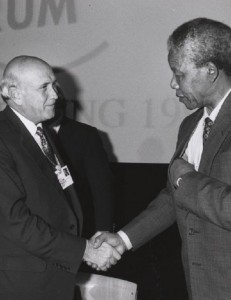The warm words from around the world following the death of Nelson Mandela seem to me to offer some powerful messages about effective integration.  I must admit to sharing a lot of the general admiration, and it was no accident that I put this picture of him shaking hands with F.W. De Klerk on the cover of my book ‘Middle Way Philosophy 2: The Integration of Desire’. What is so striking about Mandela is the way that his personal integration in prison was so decisive in the political integration of his country. In the complexity of politics, there are few such clear examples of the link between the two levels of integration, the microcosm and the macrocosm (Aung San Suu Kyi is perhaps another, but her mission to bring Burma to democracy still has a long way to go).
I must admit to sharing a lot of the general admiration, and it was no accident that I put this picture of him shaking hands with F.W. De Klerk on the cover of my book ‘Middle Way Philosophy 2: The Integration of Desire’. What is so striking about Mandela is the way that his personal integration in prison was so decisive in the political integration of his country. In the complexity of politics, there are few such clear examples of the link between the two levels of integration, the microcosm and the macrocosm (Aung San Suu Kyi is perhaps another, but her mission to bring Burma to democracy still has a long way to go).
One needs to give priority to the big picture to admire Mandela in this way. One needs to compare what actually happened in South Africa with the bloodbath that might have happened, and emphasise his obvious importance in making the difference. Part of the basis for admiration also includes Mandela’s awareness of his own limitations, indicated in his decision to step down after one term as president, together with the stories of his personal kindness, including to people whom he had every reason to hate, such as Betsy Verwoerd, the widow of a previous hardline Apartheid Prime Minister.
However, if you look in more detail at some of the many obituaries that are featuring in the media today, Mandela’s many weaknesses also become clear. His two divorces, his apparent naivete in dealing with the wealthy and enjoying wealth himself, his apparent climbdown from former left-wing ideals when in office, and his lack of attention to the details of government, are all mentioned. Despite the fact that his conversion to violence was evidently reluctant, he could also at one time be labelled a terrorist (and indeed was). If you simply project a heroic archetype onto Mandela and expect him to fulfil every detail of that archetype, you will be disappointed.
What seems more important is to separate our projection of the hero from the complexity of the man, and appreciate both for what they were. The man was flawed, but, if you look at the big picture, still a real example of how integration can actually happen, both in personal and political terms, even if it seems against the odds. As an archetype we can put his image alongside that of other flawed human beings – Gandhi, Jesus, and the Buddha, for instance, as able to more generally reflect a way forward for us. I would not put his image on a shrine and burn a candle before it, because that to me seems to create too much confusion of the archetype and the person. Nevertheless, if we can maintain that awareness of the difference, and of the real complexity of the issues that the hero works with, there is no need to set any limits to our depth of admiration for the archetype. We can admire the hero, yes, but we can particularly admire the flawed hero who engages with the full difficulty of the conditions around him.
